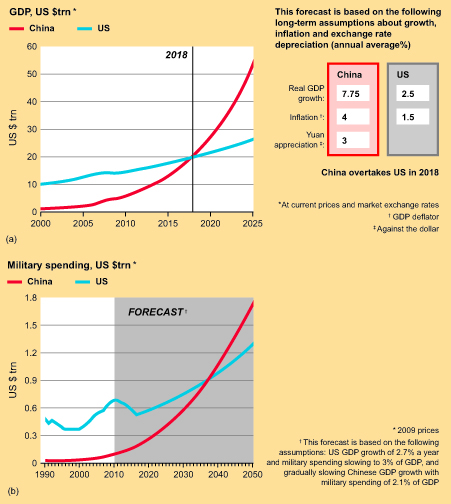4.2 Catch-up and relative gains
As we saw in Sections 2 and 3, the issue of Chinese military strength is a key one in relations between China and the United States. China’s military budget is rapidly increasing. Combined with an increasingly strident nationalist discourse, this has caused concern among China’s neighbours and within US political circles. You also saw a projection of China’s military capability (reproduced below). As with all projections, it is based on a number of assumptions, in this case assumptions about economic growth and the amount of national income devoted to military spending.
(The Economist, 2012)

Activity 5
1. Study Figure 14 above and note the assumptions this projection uses. Note down any reasons why those assumptions might be revised and what effect this might have on delaying or advancing the date at which China ‘catches up’ with the United States.
Discussion
The projection assumes that China continues to grow economically. Though it is vague about the extent of the ‘gradual slow-down in Chinese GDP growth’, a significant reduction in China’s economic growth might stall the growth of military expenditure. It also assumes US economic growth which, as the financial crisis of 2008 showed, might not be continuous. Slower economic growth would put pressure on both Chinese and US defence budgets, altering the pace at which China might or might not close the gap. Other domestic priorities in China (social spending to address rising inequalities, or spending on education as a more skilled workforce is needed) could also limit the scope to increase military spending.
Obviously the amount of money invested in the military reflects the physical strength and capability of the state to engage in war, or to defend itself against aggressors. If states focus on their capabilities in relation to another state, they are focusing primarily on relative gains: how much they have relative to the other state. As noted in Section 3, a focus on relative gains inevitably gives relations between states a zero-sum character. (If a gain by one state is tantamount to a loss by the other, the relationship can be described as having a zero-sum character.)
2. Explain, in your own words, why a focus on relative gains inevitably gives relations between states a zero-sum character.
Discussion
As noted in Section 3, if states pursue relative gains then they judge their own gains in relation to how much other states gain or lose. A focus on the gap between China and the United States is inherently a relative gains calculation – China gains by reducing the gap, but the United States loses as its advantage is eroded.
